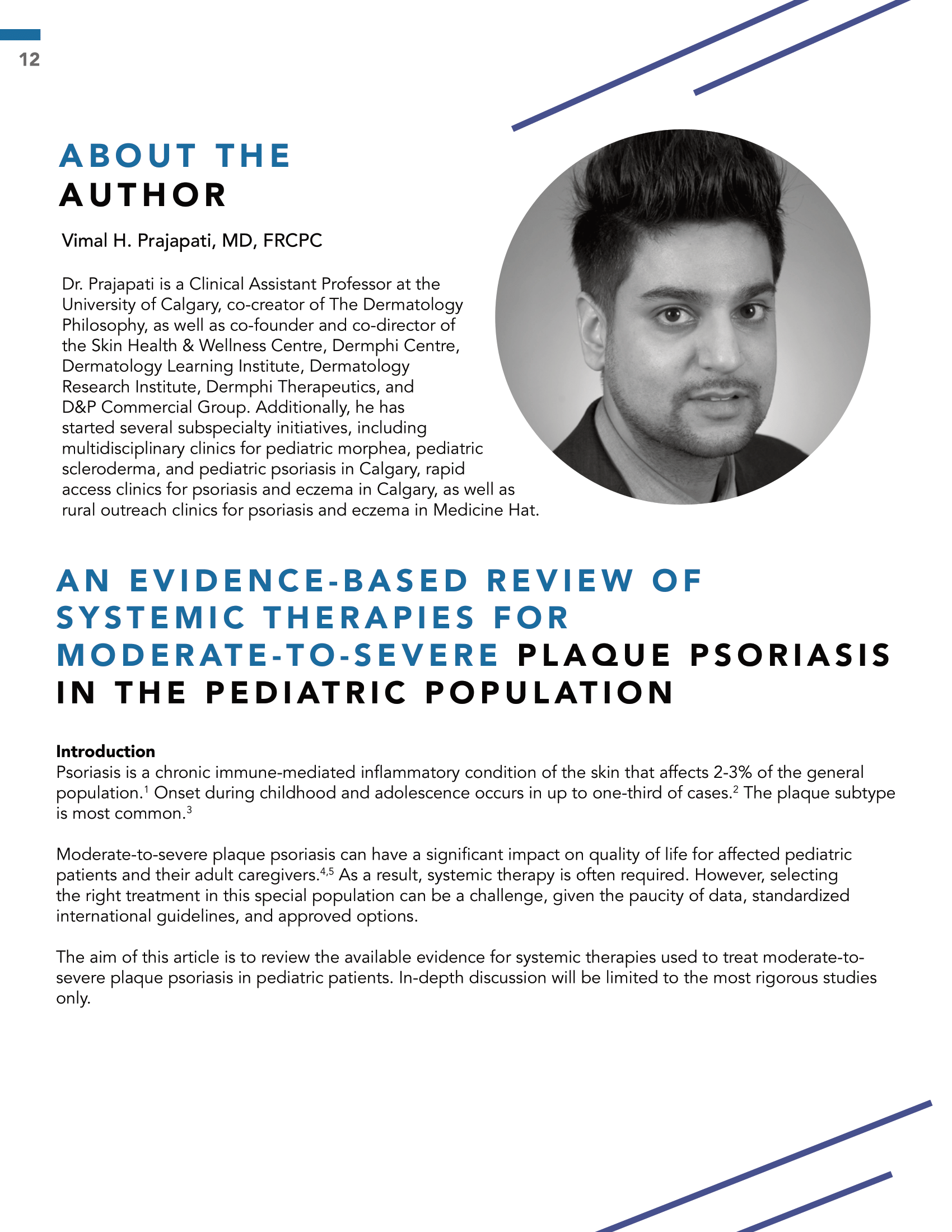An Evidence-Based Review of Systemic Therapies for Moderate-to-Severe Plaque Psoriasis in the Pediatric Population
Abstract
Psoriasis is a chronic immune-mediated inflammatory condition of the skin that affects 2-3% of the general population. Onset during childhood and adolescence occurs in up to one-third of cases. The plaque subtype is most common.
Moderate-to-severe plaque psoriasis can have a significant impact on quality of life for affected pediatric patients and their adult caregivers. As a result, systemic therapy is often required. However, selecting the right treatment in this special population can be a challenge, given the paucity of data, standardized international guidelines, and approved options.
The aim of this article is to review the available evidence for systemic therapies used to treat moderate-to-severe plaque psoriasis in pediatric patients. In-depth discussion will be limited to the most rigorous studies only.
References
Parisi R, Symmons DPM, Griffiths CEM, Ashcroft DM. Global epidemiology of psoriasis: a systemic review of incidence and prevalence. J Invest Dermatol. 2013;133(2):377-385.
De Jager ME, de Jong EM, Meeuwis KA, et al. No evidence found that childhood onset of psoriasis influences disease severity, future body mass index or type of treatments used. J Eur Acad Dermatol Venereol. 2010;24(11):1333-1339.
Tollefson MM, Crowson CS, McEvoy MT, Kremers HM. Incidence of psoriasis in children: a population-based study. J Am Acad Dermatol. 2010;62(6):979-987.
Randa H, Todberg T, Skov L, Larsen LS, Zachariae R. Health-related quality of life in children and adolescents with psoriasis: a systematic review and meta-analysis. Acta Derm Venereol. 2017;97(5):555-563.
Remrod C, Sjostrom K, Svensson A. Psychological differences between early- and late-onset psoriasis: a study of personality traits, anxiety and depression in psoriasis. Br J Dermatol. 2013;169(2):344-350.
Lansang P, Bergman JN, Fiorillo L, et al. Management of pediatric plaque psoriasis using biologics. J Am Acad Dermatol. 2020;82(1):213-221.
Bronckers IMGJ, Seyger MMB, West DP, et al. Safety of systemic agents for the treatment of pediatric psoriasis. JAMA Dermatol. 2017;153(11):1147-1157.
Ergun T, Seckin Gencosmanoglu D, Alpsoy E, et al. Efficacy, safety and drug survival of conventional agents in pediatric psoriasis: a multicenter, cohort study. J Dermatol. 2017;44(6):630-634.
Menter A, Cordoro KM, Davis DRM, et al. Joint American Academy of Dermatology-National Psoriasis Foundation guidelines of care for the management and treatment of psoriasis in pediatric patients. J Am Acad Dermatol. 2020;82(1):161-201.
Papp KA, Thaci D, Marcoux D, et al. Efficacy and safety of adalimumab every other week versus methotrexate once weekly in children and adolescents with severe chronic plaque psoriasis: a randomised, double-blind, phase 3 trial. Lancet. 2017;390(10089):40-49.
Paller AS, Hong Y, Becker EM, et al. Pharmacokinetics and safety of apremilast in pediatric patients with moderate to severe plaque psoriasis: results from a phase 2 open-label study. J Am Acad Dermatol. 2020;82(2):389-397.
Efficacy and Safety Study of Apremilast (CC-10004) in Pediatric Subjects From 6 Through 17 Years of Age With Moderate to Severe Plaque Psoriasis; ClinicalTrials.gov Identifier: NCT03701763; Accessed June 15, 2020.
A Long-term Extension Study of Apremilast (CC-10004) in Pediatric Subjects From 6 Through 17 Years of Age With Moderate to Severe Plaque Psoriasis; ClinicalTrials.gov Identifier: NCT04175613; Accessed June 15, 2020.
Paller AS, Siegfried EC, Langley RG, et al. Etanercept treatment for children and adolescents with plaque psoriasis. New Engl J Med. 2008;358(3):241-251.
Langley RG, Paller AS, Hebert AA, et al. Patient-reported outcomes in pediatric patients with psoriasis undergoing etanercept treatment: 12-week results from a phase III randomized controlled trial. J Am Acad Dermatol. 2011;64(1):64-70.
Siegfried EC, Eichenfield LF, Paller AS, Pariser D, Creamer K, Kricorian G. Intermittent etanercept therapy in pediatric patients with psoriasis. J Am Acad Dermatol. 2010;63(5):769-774.
Paller AS, Siegfried EC, Eichenfield LF, et al. Long-term etanercept in pediatric patients with plaque psoriasis. J Am Acad Dermatol. 2010;63(5):762-768.
Paller AS, Siegfried EC, Pariser DM, et al. Long-term safety and efficacy of etanercept in children and adolescents with plaque psoriasis. J Am Acad Dermatol. 2016;74(2):280-287.
Thaci D, Papp KA, Marcoux D, et al. Sustained long-term efficacy and safety of adalimumab in paediatric patients with severe chronic plaque psoriasis from a randomized, double-blind, phase III study. Br J Dermatol. 2019;181(6):1177-1189.
Landells I, Marano C, Hsu MC, et al. Ustekinumab in adolescent patients age 12 to 17 years with moderate-to-severe plaque psoriasis: results of the randomized phase 3 CADMUS study. J Am Acad Dermatol. 2015;73(4):594-603.
Philipp S, Menter A, Nikkels AF, et al. Ustekinumab for the treatment of moderate-to-severe plaque psoriasis in paediatric patients (≥ 6 to < 12 years of age): efficacy, safety, pharmacokinetic and biomarker results from the open-label CADMUS Jr study. Br J Dermatol. 2020 Mar 16; doi:10.1111/bjd.19018. Online ahead of print.
Paller AS, Seyger MMP, Alejandro Magarinos G, et al. Efficacy and safety of ixekizumab in a phase III, randomized, double-blind, placebo-controlled study, in paediatric patients with moderate-to-severe plaque psoriasis (IXORA-PEDS). Br J Dermatol. 2020 Apr 21; doi: 10.1111/bjd.19147. Online ahead of print.
Pediatric Study in Children and Adolescents With Severe Plaque Psoriasis; ClinicalTrials.gov Identifier: NCT02471144; Accessed June 15, 2020.
Study to Assess the Long-term Safety, Tolerability, Efficacy of Secukinumab in Pediatric Patients of Age 6 to <18 Years, With Moderate to Severe Plaque Psoriasis; ClinicalTrials.gov Identifier: NCT03668613; Accessed June 15, 2020.
An Open-label, Single-dose Study to Evaluate Safety, Tolerability, and Pharmacokinetics of Brodalumab in Pediatric Subjects; ClinicalTrials.gov Identifier: NCT03240809; Accessed June 15, 2020.
A Study to Evaluate the Efficacy, Safety, and Drug Concentration of Certolizumab Pegol (CZP) in Children and Adolescent Study Participants With Moderate to Severe Chronic Plaque Psoriasis (PSO) (CIMcare); ClinicalTrials.gov Identifier: NCT04123795; Accessed June 15, 2020.
A Study to Evaluate the Efficacy, Safety, and Pharmacokinetics of Subcutaneously Administered Guselkumab for the Treatment of Chronic Plaque Psoriasis in Pediatric Participants (PROTOSTAR); ClinicalTrials.gov Identifier: NCT03451851; Accessed June 15, 2020.
A Study of Subcutaneous Risankizumab Injection for Pediatric Participants With Moderate to Severe Plaque Psoriasis to Assess Change in Disease Symptoms; ClinicalTrials.gov Identifier: NCT04435600; Accessed June 15, 2020.


